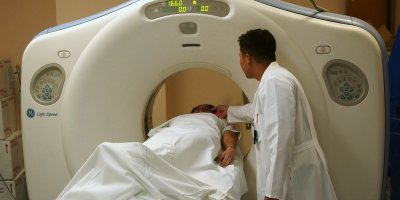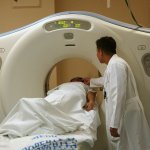
AI is becoming a key tool in the healthcare sector. Source: Shutterstock
Are we moving towards an AI-first healthcare ecosystem?
THE efficiency of a country’s healthcare ecosystem is often measured by the number of physicians per 1,000 people.
For countries in Asia, such as China, Hong Kong, Indonesia, Malaysia, and even Singapore, that number is quite small — especially when compared to Australia, the US, or the UK. Asia is in the low 1.0 score range while Australia measures in at 2.5 overall.
Hence, for these countries, it’s important to make sure that qualified physicians are available to care for patients who need their attention.
Up until now, we’ve heard of scientists and technology companies toying with the idea of using artificial intelligence (AI) to revolutionize the healthcare industry by creating robots to replace doctors.
Although that might be a bit ahead of its time, AI-based systems — working on mobile and tablet devices — are already here and making quite a significant difference to the overall healthcare ecosystem.
Imagine a world where an AI-based solution is the first point of contact for a patient at a clinic.
Basic diagnosis can be performed and appropriate medication can be prescribed for common diseases such as a fever, cough, cold, viral infection. Cuts, bruises, and surface infections too can be reviewed and referred to nurses with helpful directions.
In fact, AI-based systems could even talk to a patient with a broken or fractured arm or leg and provide directions to the imaging center for the x-ray before a doctor looks at it and a nurse cleans, medicates, and plasters the wound.
AI is making a debut in the west
In the UK, a company called Babylon has developed impressive AI-based diagnostics solutions to do just this — and the company believes the system is more reliable than human doctors. The algorithm was administered a test usually offered by the Royal College of General Practitioners — and it performed much better than the average doctor.
Babylon is also the company that is working with the UK’s NHS to create apps that transform the country’s healthcare ecosystem. In time, AI could become a part of its portfolio of offerings to the country’s residents.
Being a technology hub and a leader in new and emerging technologies, AI is already making a dent in the healthcare space in the country.
In fact, there’s a company in the ophthalmology space that has already received the approval of the US Food and Drug Administration and is set to help several patients in the coming months.
According to the Massachusetts Institute of Technology, the software is designed to detect diabetic retinopathy which occurs when high blood sugar damages blood vessels in the retina — and it does the job quite effectively.
Asia isn’t far behind
Closer to home, China’s Ping An too is working on AI solutions in the healthcare space. It debuted the One Minute Clinic at an event earlier this year and seemed keen on installing booths wherever there was a need for one.
“‘When someone makes an inquiry, the ‘AI doctor’ is the first to respond. After the AI algorithm sorts the patient’s basic condition and symptoms, the system automatically transfers the patient to a corresponding real doctor, and the real doctor makes a diagnosis according to the patient’s symptoms and prescribes medication,” said a company representative at the event.
“The ‘AI doctor’ plays the role of assistant to the real doctor, effectively improving efficiency in responding to inquiries. This is how we were able to achieve rapid responses to inquiries,’ said the Ping An Good Doctor booth staffer,”
Being the startup magnet that Singapore is, it too has attracted a few AI-powered healthcare service providers.
Most recently, Tricog, an AI-powered EKG (electrocardiogram) analysis company received fresh funding to expand its footprint in Singapore and in other parts of Asia.
Discovery AI, another AI-powered solution created under Singapore’s National University Health System has also made a debut recently — and seems to be helping the medical fraternity a great deal.
“A lot of time is needed to pull out patient data, collate it, review it, and then decide what to do. With AI, we can have tools which can be automated to pull out and collate data and present them in ways which make it much easier for health professionals to make decisions for patients,” said Ministry of Health’s Office for Healthcare Transformation’s Executive Director Professor Tan Chorh Chuan.
To be honest, AI has the potential to not only transform healthcare but also totally transform the patient experience — even without a dramatic change to the number of doctors per 1,000 patients.
In the near future, an AI-first healthcare ecosystem might be a reality, and create a comfortable experience for patients, offering better and more timely support overall.
READ MORE
- Safer Automation: How Sophic and Firmus Succeeded in Malaysia with MDEC’s Support
- Privilege granted, not gained: Intelligent authorization for enhanced infrastructure productivity
- Low-Code produces the Proof-of-Possibilities
- New Wearables Enable Staff to Work Faster and Safer
- Experts weigh in on Oracle’s departure from adland






